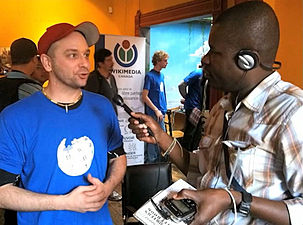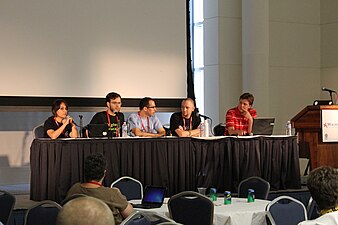Reports/2011
| Activity Reports | |||
| 2011 | 2016 | ||
| 2012 | 2017 | ||
| 2013 | 2018 | ||
| 2014 | 2019 | ||
| 2015 | |||
Wikimedia Canada's chapter and involvement with Wikimedia community
[edit]Wikimedia Chapters Conference
[edit]From 25 to 27 March 2011, two representatives from Canada attended the annual Wikimedia Chapters Conference held in Berlin, Germany. Dr. James Heilman and Alan Walker, respectively known as the future President and Vice-President of Wikimedia Canada, went as delegates to meet with leaders from other Wikimedia Chapters and discuss the future of Wikimedia Canada.
Creation of Wikimedia Canada
[edit]It has been a long path since work began on building a Canadian chapter in February 2006, and the very first informal meeting on January 2008. Took a dozen informal meetings to finally get the letters patent by Industry Canada on November 10, 2010. But after that things started to move faster; on January 24, 2011, Wikimedia Canada's website and membership signup form are online. On March 16, 2011, Wikimedia Canada hold its first annual general meeting. And on May 24, 2011, Wikimedia Canada is approved as a chapter by the Wikimedia Foundation and become officially the canadian national chapter.
Wikimania 2011 in Haifa
[edit]Eclecticology, at his own expense, attended his seventh Wikimania in Haifa, Israel. Participating in these conferences over the years has insured Canadian representation at each of them. They have been a great opportunity for networking.
Creation of Quebec Committee
[edit]
On October 2011, French-speaking Wikipedians created a provincial/language oriented committee of Wikimedia Canada: the Quebec Committee (or le Comité Québec—COMQC). The intent of the Quebec Committee is to develop projects within the Wikimedia movement vision in the province of Quebec and to encourage the representation of French within Wikimedia Canada's projects.
The first meeting was on October 18th, 2011, and we plan to meet every month in order to keep track on ideas and projects. During this meeting, we realized how ready we were to have a local subcommittee based on language. This is where we wanted to clarify the reasons of the meetings and the viability of a committee. We talked about having a Wikipedia Takes Quebec City, to have a stand at the Forum mondial de la langue française (in partnership with Wikimédia France), to take part in a couple [of] GLAM (Galleries Libraries Archives Museums) projects, and to recruit new contributors from Quebec.
After couple meetings, the core of Quebec committee became larger. Members are Letartean (mathematics teacher at the Cégep Limoilou), Simon Villeneuve (physics teacher at the Cégep de Chicoutimi), Fralambert (one of the Quebec's biggest editor on WP-fr), Cantons-de-l'Est (adult teacher, software engineer and a big editor on WP-fr), Amqui (military engineer based in New Brunswick, very involved in Aboriginal communities outreach), and Benoit Rochon (project coordinator, Board of Directors of Wikimedia Canada). Sometimes observers are taking part in those meetings such as Seeris (junior lecturer at McGill University and Université du Québec à Montréal), TCY and Serein, both from Wikimédia France.
- Quebec Committee (in French)
- First Quebec Committee meeting (in French)
GLAM (Galleries Libraries Archives Museums)
[edit]GLAMcamp NYC
[edit]
On May 2011, Wikimedia Canada's coordinator Benoit Rochon attend the GLAMcamp NYC to meet other wikimedians and GLAM representatives, to discuss the key elements of the Glamwiki.org projects. His goal is to develop his habities to get Canada's institutions to collaborate with Wikimedia's national chapter.
During GLAMcamp NYC, Benoit met one of the organizers of Wikipedia Takes Manhattan and this is what gave him the idea to organize this event in Montreal. It was also at this meeting that he could rearrange Wikipedia Takes Your City events, and give it a branding and a logo translated in many languages.
Also during this week-end, he created a PDF document "Presentation file for cultural institutions" that can be used by Wikimedia Chapters around the world for GLAM outreach. The document is in 3 languages: English, French and Spanish.
- GLAMcamp NYC main page
- Logo and branding of Wikipedia Takes Your City
- Presentation file for cultural institutions
GLAMcamp Amsterdam
[edit]
On the week-end of 2–4 December 2011, Benoit Rochon was invited to GLAMcamp Amsterdam. Besides having a presentation on Wikipedia Takes Montreal, he met several key people from Wikimedia's GLAM movement, discuss and learn from the experience of other countries. Benoit also attended the presentation of Andy Mabbett about the project QRpedia and he's currently developing this project on Canadian territory. This is also at GLAMcamp Amsterdam where he heard for the first time of the European contest Wiki Loves Monuments, which led to Canada's participation in this contest now global.
He also met some members of the Board of Wikimedia France, and discuss potential collaboration between Canada and France.
Photography
[edit]Wikipedia Takes Montreal
[edit]
With financial support from Wikimédia France, Wikimedia Canada has been able to organise Wikipedia Takes Montreal, which took place on August 28, 2011. WTMTL aimed to promote the Wikimedia sister projects, mainly Commons and Wikipedia, to improve Montreal coverage in Wikimedia Commons, to better illustrate Wikipedia articles, and also to promote Wikimedia Canada and Wikimedia Foundation. This was the first outreach event of Wikimedia Canada.
Over 300 people have signed up through good media coverage across Canada, and despite Hurricane Irene hitting Montreal, 115 people participated to the photography hunt. The first event of Wikimedia Canada expanded the number of photos of the city by more than 5,500 images, all available in Commons.
Through the unprecedented success of Wikipedia Takes Montreal, Benoit Rochon from Wikimedia Canada was invited to make a presentation to the Netherlands in the GLAMcamp Amsterdam, and also Washington for the World Conference Wikimania 2012 accompanied by his colleague Antoine Letarte. These presentations were intended to encourage Wikipedians to organize such events in their cities.
Finally, given the great success of Wikipedia Takes Montreal, this has allowed the Canadian chapter to become known in Montreal, in Canada, and also from Wikimedia chapters around the world. The event also gathered for the first time francophones Wikipedians from the province of Quebec and created relationships. It was during this event that was born the idea of creating a committee for Quebec, which serves the interests of Wikimedia Canada/Foundation but in French. Since then, francophones from Canada meet almost every month to put togheter ideas and build concrete projects.
- Press coverage on the Web
- Lightning Talk by Benoit Rochon - GLAMcamp Amsterdam
- Presentation by Benoit Rochon and Antoine Letarte at Wikimania Washington
-
Participants getting prepared for the hunt.
-
Some were very prepared!
-
People created their path around Montreal to take as much pictures as possible.
-
Due to the big crowd, participants had to be paired in teams. See yellow paper? We had a Wiki-menu!
-
Benoit Rochon gave an interview for Radio-Canada news.
-
Footage back scene for The Montreal Gazette.
-
Hard to take pictures in a hurricane...
-
... very hard...
-
Presentation at Wikimania Washington 2012.
-
Photo scavenger hunts panel, Washington DC.
Education and school projects
[edit]Copyleft day
[edit]Simon Villeneuve organised a a copyleft day at Cégep de Chicoutimi on May 27, 2011 with several guests including Wikipedians Letartean and Cantons-de-l'Est.
- Copyleft day at Cégep de Chicoutimi (in French)
Training for the APOP
[edit]In Fall 2011, Simon Villeneuve gave online training at many stakeholders in collegial education. He also developed the teaching material for these online lessons.
- Public Wiki: Initiation to collaborative work (in French)
- Association pour les applications pédagogiques de l'ordinateur au post-secondaire (APOP) (in French)
School project at Cégep de Chicoutimi
[edit]Since 2008, Simon Villeneuve, physics teacher at the Cégep de Chicoutimi and Quebec Committee core member, organised several educative projects in his astronomy and astrophysics classes. His lessons aims to initiate his students to Wikipedia in order to improve astronomy articles.
- Projet pédagogique du Cégep de Chicoutimi (in French)
- Results and reports for Fall 2011 (in French)
University of British Columbia
[edit]Wikimedia was at the University of British Columbia introducing students and staff to editing Wikipedia.
Outreach to medical students, profs and community
[edit]McMaster University in Ontario
[edit]Wikimedia Canada and McMaster University are hosting a half day workshop on the afternoon of October 4, 2011 (starting at 1pm) at McMaster University Student Centre Room 319 to discuss the whys and hows of editing Wikipedia content. The goal of the event is to improve the McMaster community's ability to contribute to medical and health pages on Wikipedia; however, all students, faculty and staff are welcome, as is the general public.
Wikimedia Canada in India
[edit]Dr. James Heilman President of Wikimedia Canada, as part of the Global Education Program and in collaboration with the Medical Education Unit of University College of Medical Sciences of India is working on organizing a half day workshop in New Delhi, India to discussion the significance of Wikipedia in medicine and how one becomes involved.
Wikimedia Canada in Nepal
[edit]Dr. James Heilman President of Wikimedia Canada, as part of the Global Education Program, and in collaboration with Dr. Shankar, KIST Medical College of Nepal is working on organizing a half day in Kathmandu, Nepal to discussion the significance of Wikipedia in medicine and how one becomes involved.
WikiProject Medicine Translation Task Force
[edit]December 2011, Dr. James Heilman, president of Wikimedia Canada, began a collaborative effort with the NGO Translators Without Borders and the company Content rules to improve and translate high quality medical content from English into other languages. Over 100 translations have been completed into more than 30 languages and efforts are ongoing.












